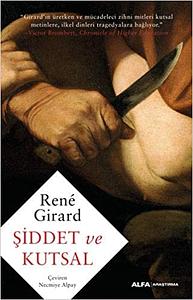Take a photo of a barcode or cover
This is a fascinating combination of anthropology and literary theory. I'm skeptical of the broad claims of the analysis, but it at least provokes some interesting thought processes about atonement.
Leídos , del mismo autor, El sacrificio" y "Cosas ocultas desde la fundación del mundo", este ensayo no me ha aportado muchas novedades. No obstante, cronológicamente es anterior a ellos.
Pese a todo lo que de debatible tiene (véase mi crítica en "Cosas ocultas desde la..."), la erudición e intuición de Girard sigue siendo muy estimulante.
Pese a todo lo que de debatible tiene (véase mi crítica en "Cosas ocultas desde la..."), la erudición e intuición de Girard sigue siendo muy estimulante.
Oh, how I love reading anthropology! Just when I get caught up in the endless facebook stream of arguments and memes--religion, politics, TV, and corporate-controlled and produced mass culture--I step back into a culturally removed, dispassionate space and compare my culture to ancient Greece, or the Bushmen, or some tribe in Borneo and understand how silly and deadly serious are our bizarre choices manifest as cultural institutions. Perspective is everything. So refreshing.
Girard's arguments here are amply summed-up and synopsized elsewhere (even on this page by one Jennifer who does a fine, exhaustive job) so I'll leave it to you to explore this book and its detailed contents on your own. It posits that human culture begins with groups of people attempting to deal with the problem of human-on-human violence through the institution of sacrifice and the argument is largely convincing. The argument is also soiled/weakened somewhat by being both too strenuously (and repetitively) argued and, as in most blanket, all-encompassing theories of anything (particularly ALL world cultures) there has to be a reductionist element and a "latency" clause so that anything that doesn't fit into the system actually fits into the system by not fitting into the system. Still. 99% of the non-fiction books published are useless self help, celebrity gossip, and silly politicians arguing battles that philosophers solved centuries ago but the common idiot can still not grasp with their nationalistic education and superstitious adherence to religion. So five fucking stars to a real thinker and the finger to all major publishing houses, the MacDonalds-s of contemporary culture!
We need more scapegoats after all. As Girard points out, poets are anti-social because we pity the scapegoat. I'd like to see society sacrificed so that one outsider might finally realize him/herself as both the sacred and the profane. A true deity? Who wants all that order anyway?
We're still the flowers in the dustbin.
Girard's arguments here are amply summed-up and synopsized elsewhere (even on this page by one Jennifer who does a fine, exhaustive job) so I'll leave it to you to explore this book and its detailed contents on your own. It posits that human culture begins with groups of people attempting to deal with the problem of human-on-human violence through the institution of sacrifice and the argument is largely convincing. The argument is also soiled/weakened somewhat by being both too strenuously (and repetitively) argued and, as in most blanket, all-encompassing theories of anything (particularly ALL world cultures) there has to be a reductionist element and a "latency" clause so that anything that doesn't fit into the system actually fits into the system by not fitting into the system. Still. 99% of the non-fiction books published are useless self help, celebrity gossip, and silly politicians arguing battles that philosophers solved centuries ago but the common idiot can still not grasp with their nationalistic education and superstitious adherence to religion. So five fucking stars to a real thinker and the finger to all major publishing houses, the MacDonalds-s of contemporary culture!
We need more scapegoats after all. As Girard points out, poets are anti-social because we pity the scapegoat. I'd like to see society sacrificed so that one outsider might finally realize him/herself as both the sacred and the profane. A true deity? Who wants all that order anyway?
We're still the flowers in the dustbin.
I really enjoyed this read. It's very well written and the philosophy is well explained.
challenging
slow-paced
challenging
informative
slow-paced
informative
slow-paced
Gran ensayo antropológico sobre los fundamentos de las comunidades humanas y cómo desde la violencia se funda lo sagrado (y con ello el orden cultural). Me ha parecido muy acertada la critica a Freud.
challenging
informative
reflective
slow-paced
It was quite repetitive and in my opinion pretty boring. I thought there was going to be more biblical analysis as it stated in the blurb that there would be, but apart from a few quotes in the conclusion the book was mainly based around Greek myth (specifically Dionysus), Sigmund Freud, and the Oedipus Complex. There are a few sections on other communities/societies which was interesting.
Graphic: Death, Incest, Cannibalism
Moderate: Animal death




